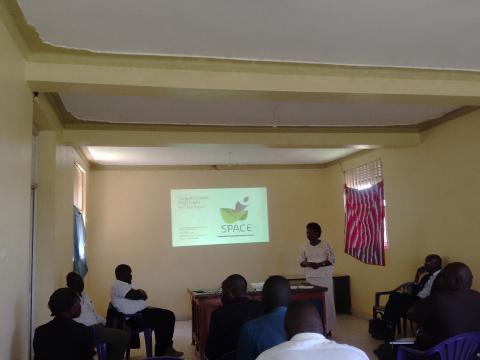4,500 youth to attain career devpt skills

Ms. Monica Koliba Kotevu, Maracha Deputy RDC delivering her remarks during the program inception meeting in the District Boardroom. PHOTO/ATULE MOSES
4,500 youth in Maracha District are to benefit from a soft skills and entrepreneurship program targeting post-secondary learners and graduates.
During the inception meeting of the 18-months project on Thursday May 8, Ms. Monica Koliba Kotevu, Maracha Deputy Resident Commissioner (RDC), told the organization implementing the project, Sustainable Plan and Action for Community Empowerment (SPACE), to varnish the RDC’s Office with the implementation matrix of the project to ease monitoring and supervision.
“We need your work plan to see what you are going to do and where you are going, if we are not so busy we can also accompany you,” she requested.
Hon. Bosco Asea, Maracha District Vice Chairperson, noted the district is faced with the challenge of unemployment among youth a burden that the Shs 108 million program will alleviate through opening employment opportunities for them.
“My humble appeal to those involved this is to ensure that we give a sense of direction to the youth. We join hands with the partner that is coming on board to ensure that we mobilize adequately,” he said.
Mr. Sam Dramani, Maracha District Community Development Officer (DCDO), who is coordinating the implementation of the project on behalf of the district, called for a comprehensive mobilization strategy through the lower local government structures for the targeted number of beneficiaries to be realized and the right people admitted for the training sessions under the programs.
Mr. Rogers Adriko, an official with SPACE, said the program that has a target composition of young women constituting 70 percent of the beneficiaries, persons with disabilities 10 percent, displaced persons 10 percent, will seek to provide career training and development to improve their employability and also create entrepreneurship awareness.
“You might have the papers but you are unemployable may be because of the way you conduct yourself. For the soft skills you need that mind change,” he informed the leaders.
He added: “We are going to tell them how they can explore opportunities, how they can start a business. We have people who got money under Parish Development Model (PDM) but after getting the money some is in already in Arua City seriously dancing.”
Mr. Adriko said a similar project has part been implemented in some West Nile district by other organizations with testimonies of transformation registered, and is not afraid will cooperation from all stakeholders the same can be replicated in Maracha District.
Mr. Patrick Olila, Maracha District Chief Administrative Officer, said that having more youth engaged in economic productivity is a boost to local revenue collection as many mobilsation sources are created in addition to reducing insecurity.
He said that most youth lack patience and a long-term view on how they want to lead their lives which forces them to not take serious the opportunities that are availed to them.
“The youth have a mindset that cannot help this nation. Let us help them to be far sighted and help them move forward. Whatever help you need we are available,” he pledged.
Dr. Paul Onzubo, Maracha District Health officer, challenged the political and technical leaders to reflect on the role of their respective sectors in supporting the human capital development program excluding the efforts of non-governmental organizations.
“How I wish we could have a very sincere breakdown the extent to which we as the individual stakeholders we have collectively used our budgets to undertake human capital development but also implement the vision of the district,” he said.
SPACE, headquartered in Arua City, is a co-implementer of the project with Brighter Monday Uganda with funding from Mastercard Foundation. The Foundation seeks to enable 30 million young people across Africa to access dignified and fulfilling work by 2030, with a focus on young women, refugees and displaced persons, and people with disabilities.
The project is being implemented in other West Nile district that include: Koboko, Yumbe, Obongi and Adjumani.
